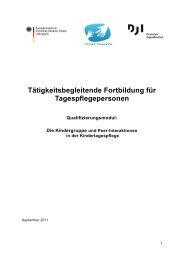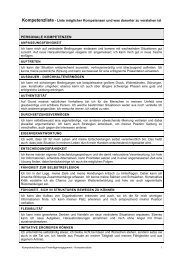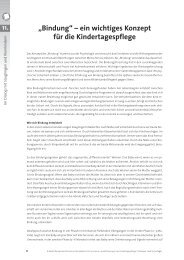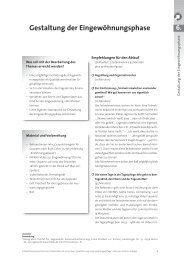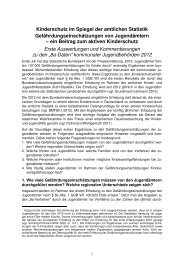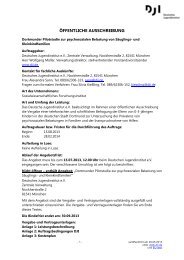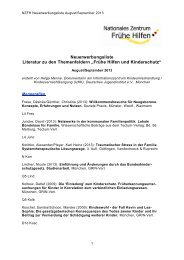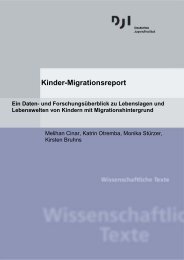download - Deutsches Jugendinstitut e.V.
download - Deutsches Jugendinstitut e.V.
download - Deutsches Jugendinstitut e.V.
Create successful ePaper yourself
Turn your PDF publications into a flip-book with our unique Google optimized e-Paper software.
This public authority network has the task of coordinating the needs of local associations<br />
and incorporating these into the LOS process. The network of public authorities is<br />
involved in the development and continuation of the action plan strategy and is<br />
represented in the accompanying committee.<br />
A local coordination office is established in one of the public authorities participating in<br />
the network. The relevant department releases an administrative member of staff for this<br />
purpose; 20 % of the LOS development fund can also be claimed as material expenditure<br />
for the coordination office. The local coordination office has a central role: it manages and<br />
controls the local implementation of the programmes, is responsible for the local transfer<br />
of information within the area and for the acquisition and consultancy service for the<br />
organisations involved in the micro-projects. Further responsibilities include development<br />
fund accounting and public relations work to inform the public of the local action plan<br />
activities.<br />
The local network also participates in the implementation of LOS in the development<br />
area – the network should become particularly involved in the compilation and<br />
continuation of the action plan and is also represented in the accompanying committee.<br />
The local network is not an institutionalised body, but a loose federation of actors with<br />
responsibility within the development area such as social institutions, schools, clubs,<br />
associations and organisations, individuals, inhabitants, target group representatives,<br />
businesses and church parishes.<br />
As mentioned above, support for micro-projects is organised locally and not determined<br />
on a national basis by the federal ministry or federal coordination office. The selection of<br />
micro-projects is undertaken by the accompanying committee in each development area<br />
which should in addition to representatives from public authorities also primarily include<br />
civil society actors, particularly representatives from the appropriate target groups and local<br />
inhabitants. These persons are not only the addressees of the project, but also participate in<br />
the decision-making processes concerning these projects. Local inhabitants should also be<br />
involved in the creation and continuation of the local action plan strategy. The direct<br />
involvement of the target group and/or inhabitants of the development area as active codesigners<br />
is a special feature of LOS which has been implemented in all development areas.<br />
Additionally, a balanced distribution of interest groups can be established in the LOS<br />
accompanying committees.<br />
The LOS concept of local programme implementation is pursuing both a top-down<br />
approach with local involvement and a bottom-up approach through the involvement of<br />
civil society actors.<br />
Implementation<br />
A total of ca. 87 million € was available for the implementation of LOS in the previous<br />
four development periods. A further 24 million € is planned for the fifth development<br />
period beginning on 01.07.2007. Originally, three phases with funds of ca. 40 million €<br />
were foreseen; this is evidence that LOS has become a successful factor in Germany.<br />
A total of 287 local action plans in 200 local and regional authorities have been<br />
supported for up to four years. 11,937 micro-projects have already been set up and have<br />
71



